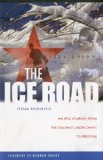Good fortune — luck — manifests itself in a variety of ways. Frequently, just how lucky we are comes only with hindsight and even then we may not realize just what contributed to a serendipitous result. Yet the extent of a person’s fortune may well be a matter of perspective, much like the adage about regretting having no shoes until seeing the person with no feet.
 Normally, a person wouldn’t think a memoir about being forced into frozen labor camps during World War II is the type of work that examines luck. Yet Stefan Waydenfeld’s The Ice Road: An Epic Journey from the Stalinist Labor Camps to Freedom shows the full range of good and bad fortune and how capricious it can be.
Normally, a person wouldn’t think a memoir about being forced into frozen labor camps during World War II is the type of work that examines luck. Yet Stefan Waydenfeld’s The Ice Road: An Epic Journey from the Stalinist Labor Camps to Freedom shows the full range of good and bad fortune and how capricious it can be.
Waydenfeld was a teenager in Otwock, Poland, a city not far from Warsaw, as the European continent moved toward the outbreak of World War II. The son of a medical doctor and a medical bacteriologist, Waydenfeld enjoyed the benefits and opportunities afforded by a comparatively comfortable life, one he even terms “idyllic.” That would end rather abruptly when Germany invaded Poland on September 1, 1939, and become even worse when the Soviet Union invaded the country from the east 16 days later. Waydenfeld’s father, who had served as a medical officer in the Polish Army, was mobilized before the German invasion. Five days after the German invasion, Waydenfeld, then 14, set off on foot with friends toward a mustering point to the east to join the Army. He and his friends wouldn’t join the Army on their trip — and he would not see his home for another eight years.
Through a fortunate turn of events, Waydenfeld’s father located him when he took shelter with another family. And, by chance, his mother joined them just as they were going to attempt to return to Otwock to find her. Yet the Waydenfelds faced a dilemma: try to return to the portion of Poland occupied by Germany or stay in what was now the Soviet occupied section. They ending up staying in the Soviet-controlled area. Ultimately, although not technically prisoners, hundreds of Poles were deported in crammed cattle cars to Siberian labor camps in 1940. The Waydenfelds ended up in Kvasha, a camp in far western Siberia with a subarctic climate. “Here you shall live,” they were told.
Kvasha was not a prison camp. There was housing and food available. Yet survival depended on working in the great forests of the area cutting and removing timber. The phrase frequently heard from the Soviet officials at the camp was, “He who does not work, does not eat.” Although in his teens, Waydenfeld performed a wide variety of difficult tasks in the camp. The worst, which gives the book its title, was when he and his father were part of a crew charged with maintaining “the ice road.” The road consisted of iced ruts on which sleds would transport felled trees in the midst of the winter. Maintenance required traveling up and down the road gathering water from the adjoining river and resurfacing the ice in the ruts. Often working at night, the task not only involved working outdoors in sub-zero temperatures but often being coated with ice as a result of the water they were required to spread on the road. The physical burdens and distress of the work almost beggars the imagination.
After Germany invaded the Soviet Union in June 1941, the Soviets released the Poles, although they were limited to places within the Soviet Union and were responsible for their own transportation. Although this meant the Weydenfelds would leave Kvasha, it also embarked them on a journey of thousands of miles through Kazakhstan, Uzbekistan and Turkmenistan by rail, on foot and by truck. They scavenged local markets for food and took up housing where available, aided by the senior Weydenfeld’s ablity to occasionally find employment thanks to his medical degree. The family and numerous others eventually found passage to Tehran and outside Soviet and German influence.
Waydenfeld recounts events with an excellent eye for detail, both in terms of events and the family’s surroundings. Some readers might even wonder about the extent of the detail given that he did not keep a diary and only started making notes of his experiences some 15 years after. Regardless, The Ice Road tells a compelling story about the treatment of the Poles during World War II, an aspect of the conflict that is often overlooked. Additionally, the book includes a look at the Polish deportations and the formation of a Polish Army corps, which Waydenfeld joined once outside Soviet control.
Despite the hardships it recounts, The Ice Road is a story of good fortune in that the Waydenfeld family survived. Yet a couple items in his recounting show just how fortuitous they may have been. For example, in May 1940 the Waydenfelds stood in line for a German repatriation train that would have returned them to Otwock and the part of Poland occupied by the Germans. The family ahead of them in line filled the quota of returnees and they were told to go back to where they were staying and wait for the next repatriation train. There was never another and they were deported to Siberia.
Or they could look back just a bit more. In May 1939, the Waydenfelds took a cruise to the Mediterranean. They picked it over one slated to go to New York City in August 1939. That ship was in New York City when the war broke out — and the passengers spent the war in the United States.








